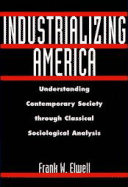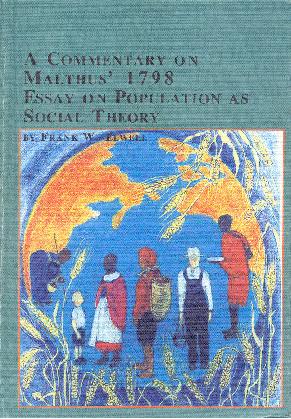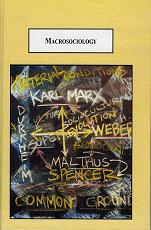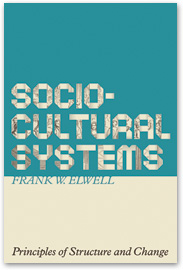Works
by Frank W. Elwell
The
Evolution of the Future (Praeger, 1991)

About this
Title:
Written by sociologist Frank W. Elwell Chairman of the
Department of Sociology, Anthropology and Social Work at
Murray State University. Rather than relying on simple trend
analysis, the book critiques futurism from the standpoint of
cultural materialism, a contemporary theory rooted in social
ecology/evolutionary theory. The book includes:
- A revision of Cultural
Materialism a systems theory that attempts to account
for the origin, maintenance, and change of society.
- The social evolutionary
process supported by the latest research and
supplemented with case studies and illustrations.
- The role of elites
discussing the nature and extent of their power in
determining future social evolution.
- The politics of the
future examining the clash between the technological and
ecological worldviews.
- Environmental limits
clarifying the empirical and theoretical underpinnings
to the debate.
- A critique of
postindustrialists including the popular utopian works
of Toeffler, Naisbitt and other optimists.
- The new totalitarianism
an update on the dystopia as envisioned by Huxley,
Heilbroner, and others.
Industrializing America:
Understanding Contemporary Society Through Classical
Sociological Analysis (Praeger, 1999)

About this
Title:
An analysis of any part of the social system must be
firmly rooted in a framework that outlines the whole system
and the interrelationships of the various parts. Building
on classical sociological theory, this volume proposes an
original and comprehensive systems theory of sociocultural
stability and change, which combines fundamental ecological
relationships with social structures and culture.
Relationships and concepts developed by Marx, Weber,
Malthus, Mills, Harris and Durkheim are explained and
synthesized into a coherent perspective, which is used to
examine multiple phenomena in hyper industrial societies:
- the structure of power
- bureaucracy
- the irrationality
factor
- globalization
- economic
rationalization
- current workplace
turmoil
- family and community
- agriculture and health
care
- higher education and
politics
- the rise of a new
ideology of technology
- possibilities for the
future
The author argues that recent
changes in social structures (for example corporations,
education, or the family) and culture (our socially created
and shared symbolic understanding of our world) are
interrelated and rooted in massive changes in population
size and industrial growth. By systematically relating the
analysis of these sociocultural phenomena to the whole and
to one another this volume presents a framework that can
serve to organize and integrate many diverse theories,
insights, and much empirical information into a
comprehensive worldview.
A Commentary on
Malthus (Mellen, 2001)

About this Title:
The book is a commentary on
Malthus’ 1798 Essay on Population that attempts to
tie the interpretation closely to the original Essay
rather than to the politically charged reactions to that
Essay. Malthus' master work is not a simplistic
projection of future population growth and inevitable
collapse, the Essay is actually a far subtler
ecological-evolutionary social theory. Malthus’ theory is
fundamentally based on the relationships between population
and food production. Increase the supply of food, he
argues, and population will rise to meet this increase.
This, he asserts, means that the race between population and
resources can never be truly won by any sociocultural
system. Therefore, some measure of social inequality is
inevitable in all human societies.
The work includes commentary
and criticism of Malthus’ methodology, the materialist,
evolutionary, and functional elements of his theory, as well
as the application of his theory to understanding the nature
of welfare programs and possibilities for social progress.
Macrosociology:
Four Modern Theorists
Paradigm Publishers (2006)

About this
Title:
This book examines the work of four modern theorists who have
taken on the larger themes of classical social theory.
C. Wright Mills, Marvin Harris, Immanuel Wallerstein,
and Gerhard Lenski have examined such phenomena and
processes as the rise and impact of capitalism, the
centralization and enlargement of authority, inequality,
and the intensification of production and population.
Borrowing what is useful from the classics as well as
relying on contemporary practitioners and empirical
evidence, each theorist adds his own insights and
interpretations in constructing a comprehensive
perspective of sociocultural stability and change. This
book fully summarizes and documents each perspective
using language and examples that resonate with the
general reader. A short biography on each theorist is
also provided.
Frank
Elwell is a professor of sociology and the founding dean
of the School of Liberal Arts at Rogers State University.
He is the author of
The Evolution of the Future,
Industrializing America,
and A Commentary on
Malthus’ 1798 Essay as Social Theory.
Macrosociology: The Study of Sociocultural
Systems. Mellen, 2009

About the Title:
This
book is intended to
introduce students to the classical social theory of Karl Marx, Emile
Durkheim, Max Weber, and
T. Robert Malthus, as well as the modern
expressions of these perspectives. It does this through
two mechanisms. First, it provides an overview and
critique of the four major classical traditions in
sociology. Rather than discussing these theories as
history, the book will focus upon elements of the
perspectives that have proved useful in understanding
sociocultural systems. Then, the book will provide an
overview and critique of the perspective and analysis of
three contemporary social scientists writing within each
of these traditions. For contemporary followers of Marx the theories of
Immanuel Wallerstein,
Harry Braverman, and John Bellamy Foster will
be examined. Representing the Durkheimian worldview will
be Stjepan Mestrovic, Robert K. Merton,
Robert A. Nisbet, and Neil Postman.
Modern day Weberians
are represented by C. Wright Mills, Norbert Elias, and George
Ritzer. Finally, as modern
representatives of Malthusian/Spencerian theory,
the book will examine the theories of
Ester Boserup, Gerhard Lenski, and Stephen K. Sanderson.
F. The overarching goal of the book is to
provide students with an in-depth understanding of each
of the macro-sociological traditions and their
usefulness in understanding contemporary societies.
Through study of contemporary social scientists such as
Lenski, Braverman, Mestrovic, and Elias students will
truly come to appreciate the usefulness of
classical social theory in understanding the modern
world. The concluding chapter demonstrates how
the various perspectives can be integrated into a single comprehensive worldview.
Sociocultural Systems: Principles of
Structure and Change, Athabasca 2013

Macrosociology—the study of large-scale social structures
and the fundamental principles of social organization—was
the style of sociology practiced by the founders of the
discipline. Today, the social theories of Karl Marx, Max
Weber, Émile Durkheim, and Herbert Spencer (among others)
are commonly studied as part of the history of the field,
but, although the macrosociological approach that these
thinkers advocated is still employed, it no longer dominates
the discipline. Instead, sociologists typically adopt a
narrower focus, specializing in areas such as social
psychology, medicine, religion, or the study of social
stratification. Examining the bigger picture is a task often
left to public intellectuals.
Sociocultural Systems aims to reinstate
macrosciology as the heart of the discipline by
demonstrating that both classical and contemporary
macrosociologists stand upon common ground. Focusing on the
broad issues that concerned the founders, Elwell addresses
questions such as: Historically, what factors accounted for
the origin, survival, and evolution of sociocultural
systems? Why were some societies more technologically
advanced than others? What is the origin of capitalism? What
factors determine the allocation of goods and services
within and among societies? What effects do changes in
government and economic institutions have on communities?
Elwell argues that, as evolution does for biology, the
macrosociological paradigm offers an analytical strategy
that can be used both to guide and prioritize research in
all of the myriad specialties within sociology and to lay
forth an orderly body of knowledge for students. Clearly
articulating important sociological principles,
Sociocultural Systems provides a critical understanding
of social institutions and issues, while also furnishing a
framework for possible solutions to the perennial social
crises that are part and parcel of the development of human
societies.
Dr.
Elwell's Home Page
©Frank Elwell
Send comments to [email protected]
.
|